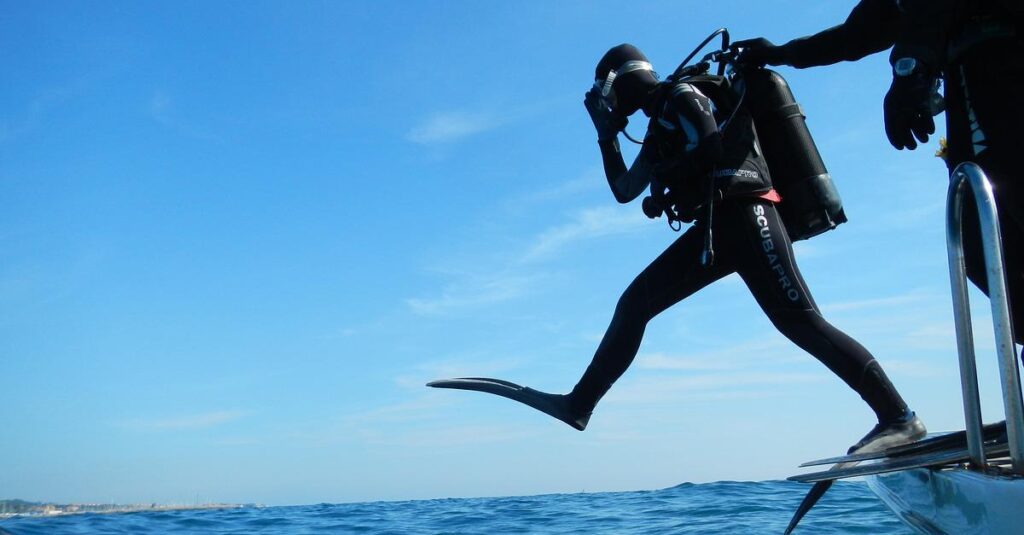

While we understand how to get around on land perfectly fine, scuba diving requires time to relearn these processes. The time you spend learning to dive varies on your expectations, but it also affects the opportunities you have during the dive.
Some places offer single day courses that allow you to learn certain basics of scuba diving before attempting in a controlled environment. These are nowhere near as intensive as a full course, and you will not learn everything you need to safely dive in a standard environment.
This may seem like a quick solution if you’re given the chance, but there are several details to consider. Keep reading to learn what the timeline for learning to dive looks like and what happens when you try to shorten it.
How Fast Can You Learn to Scuba Dive?
You can learn the basics of scuba diving in as little as one day, but most courses last an average of 4 to 6 weeks. This allows you enough time to condition your body for diving while understanding your course material and putting it into action.
Trying to thin out the material to fit into a single day ensures that you aren’t getting all the information that you need, and it limits what you can do in your dive. These courses are often offered by resorts and include:
- A theoretical lesson
- A swimming pool lesson
- A tank dive in a controlled environment with provided equipment
While 4 to 6 weeks may not seem like the fast track, this is the perfect timeline to absorb the information you need while diving and get in the water a few times. This is the usual timeline for certain certifications that you need to dive in most areas or on your own.
Is it Hard to Learn to Scuba Dive?
Learning to scuba dive is not difficult to start. Most of your coursework focuses on:
- Basic information, such as gear, how diving affects the body, and how to handle changes in the water
- Skills and techniques, such as putting on the gear, what to do if you lose your mask, and how to clear a mask of water
- Risks and safety information
- Terminology
- Hand signals
You don’t need a four-year degree to scuba dive, but you should approach your coursework with a readiness to learn. Difficulty depends more on whether you work on remembering these details and condition your body or you try to skate by without putting in effort.
Can I Scuba Dive Without Certification?
You can scuba dive without certification, as there is no law against it, but the hazards involved make this difficult. Most dive operators will refuse to take you out without certification, and setting up a dive on your own is incredibly dangerous.
Certification shows that you understand the risks of scuba diving and have the skills to limit them. A dive operator wants to make sure everyone has a good time, and taking on someone without the proper skillset is a major liability.
Resort courses allow you more opportunity to dive without certification, but they’re only good for a short period of time and your dive occurs in a controlled environment. While they’re useful for last-minute decisions, serious divers should always seek certification.
How Long Does it Take to Master Scuba Diving?
Mastering scuba diving is subjective, but obtaining the PADI Master Scuba Diver Certification is a clear sign you’re on the right track.
It can take anywhere from 6 weeks to 6 months to complete all the prerequisites, and we’ll break that timeline down for you below. Keep in mind that e-learning is self-paced, and most will not complete the entire online course in one sitting. You should also allow time for the required number of dives and proper conditioning.
Open Water Diver Certification
- E-Learning Time: 5 to 10 hours
- Time with Instructor: 4 to 7 days
- Prerequisites: Medically fit; 10 years or older
Open Water Diver is the first certification hurdle to clear. This sets you up with all the basic information needed for safe diving, and passing the course will allow you to dive up to 60 feet independently with a diving buddy.
Advanced Open Water Diver Certification
- E-Learning Time: 6 to 8 hours
- Time with Instructor: 2 to 3 days
- Prerequisites: Open Water Diver certification; medically fit; 12 years or older
The natural next step is the Advanced Open Water Diver Course. This focuses on improving the skills you learned in the beginner course, and you get to specialize in certain areas such as Digital Underwater Photography or Fish Identification.
Rescue Diver Certification
- E-Learning Time: 8 to 12 hours
- Time with Instructor: 4 to 7 days
- Prerequisites: Open Water Diver certification; Advanced Open Water Diver certification; medically fit; 12 years or older; CPR/first aid and secondary care training
The Rescue Diver course veers off from learning diving skills and focuses on your wellbeing and safety and the rescue of divers around you. It aims at improving your situational awareness, and you’ll need a record of time in the water for certification.
Other Details
Once you have the three certifications listed above, you can pursue the Master Scuba Diver certification. PADI also requires 5 PADI specialty diver certifications and a minimum log of 50 dives.
While you may be in a rush to get the most out of your diving experience, it’s more important to pass through your courses at a speed most conducive to learning. Mastering diving means you understand your limitations and your needs, and you take the time to set up the safest diving environment for yourself and others.
References
https://www.padi.com/courses/master-scuba-diver
https://www.padi.com/courses/open-water-diver
https://www.padi.com/courses/advanced-open-water
https://www.padi.com/courses/rescue-diver
https://www.padi.com/education/specialty-courses
https://scubadiverlife.com/training-timeline-novice-diver-divemaster/
https://aquaworld.com.mx/en/blog/scuba-diving-without-certification-can-it-be-done/
